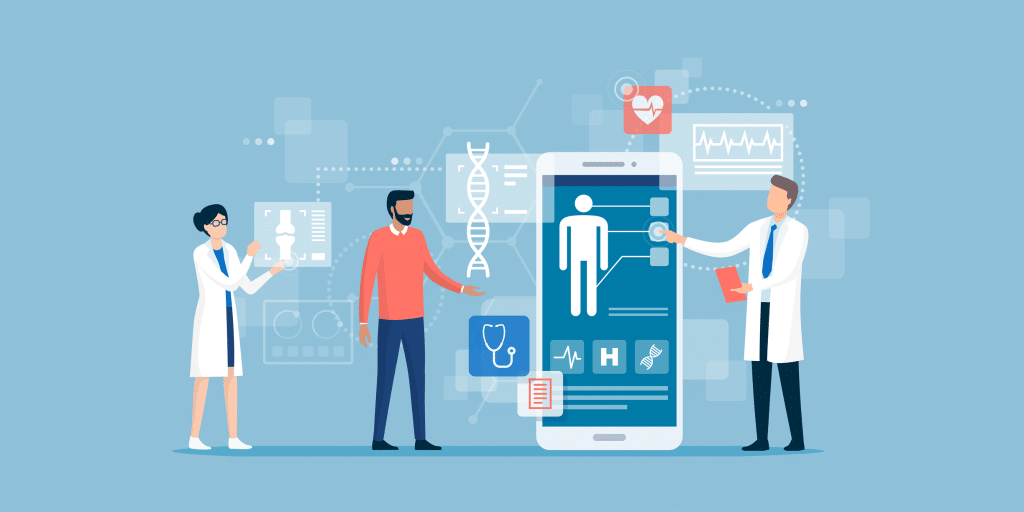Mobile applications have taken the IT world by storm, and you can guarantee the pharmaceutical business is following suit. A large number of new pharma app development services appear every year. By giving us easy access to healthcare services, these pharmaceutical apps have changed the game and become a need in our life.
In this article, we will explore the top 10 pharma apps, delving into their features, advantages, and drawbacks.
Understanding Pharma Apps: How They Function and Their Purpose
Before diving into the top 10 pharma apps, it’s crucial to grasp their concept and the reasons behind their existence. Pharma apps are mobile applications that serve as a bridge between patients, healthcare providers, and pharmacies. They offer a wide array of functionalities, including medication reminders, prescription refills, virtual consultations, and access to medical information databases. The primary aim of these apps is to enhance convenience, promote medication adherence, and empower individuals to take charge of their healthcare needs.
The Top 10 Pharma Apps: Features, Pros, and Cons
Let’s now explore the cream of the crop, the top 10 pharma apps, and shed light on what they bring to the table.
MediTrack
- Basic Info: Developed by a leading pharmaceutical company, MediTrack boasts an intuitive interface and comprehensive medication management features.
- Functionality: Users can effortlessly track their medication schedules, receive reminders, and order refills directly from partnered pharmacies.
- Pros: User-friendly design, robust medication management, and hassle-free prescription refills.
- Cons: Limited availability of partnered pharmacies and occasional synchronization issues.
HealthConnect
- Basic Info: HealthConnect, a crowd favorite, focuses on connecting patients with healthcare providers.
- Functionality: The app offers virtual consultations, appointment scheduling, and secure messaging with doctors.
- Pros: Convenient access to healthcare professionals, reduced waiting times, and efficient communication.
- Cons: Limited availability of virtual consultations in certain regions and occasional technical glitches.
RxTracker
- Basic Info: RxTracker is renowned for its advanced prescription tracking and medication information features.
- Functionality: Users can scan prescription barcodes, receive dosage instructions, and set medication reminders.
- Pros: Accurate prescription tracking, comprehensive medication details, and personalized reminders.
- Cons: Inconsistent barcode scanning accuracy and occasional slow loading times.
PharmaCare
- Basic Info: PharmaCare is a comprehensive pharma app that combines medication management and health monitoring tools.
- Functionality: The app provides medication reminders, health tracking features, and enables users to share data with healthcare professionals.
- Pros: All-in-one app for medication management and health monitoring, data sharing capabilities.
- Cons: Complex interface for beginners and occasional synchronization issues with external devices.
MyMeds
- Basic Info: MyMeds focuses on medication adherence and personalized reminders, placing simplicity at the forefront.
- Functionality: Users can set up medication schedules, receive reminders, and benefit from medication interaction alerts.
- Pros: Simple and intuitive interface, customizable reminders, and medication interaction warnings.
- Cons: Limited functionality beyond medication reminders and occasional notification delays.
DocFinder
- Basic Info: DocFinder simplifies the process of finding and booking appointments with healthcare providers.
- Functionality: The app allows users to search for doctors, view their profiles, and schedule appointments.
- Pros: Easy appointment booking, access to doctor profiles and reviews, and location-based search.
- Cons: Limited availability of doctors in certain areas and occasional outdated information.
MedDose
- Basic Info: MedDose is a medication management app that ensures users stay on track with their prescriptions.
- Functionality: The app provides medication reminders, dosage information, and enables users to track their adherence progress.
- Pros: User-friendly interface, detailed medication instructions, and adherence tracking.
- Cons: Limited integration with pharmacies for prescription refills and occasional minor bugs.
PharmaConnect
- Basic Info: PharmaConnect focuses on connecting users with nearby pharmacies and offering convenient medication services.
- Functionality: Users can locate pharmacies, order prescriptions, and receive notifications when prescriptions are ready.
- Pros: Easy access to nearby pharmacies, prescription order notifications, and pharmacy ratings and reviews.
- Cons: Limited pharmacy coverage in rural areas and occasional delays in prescription notifications.
PillPal
- Basic Info: PillPal emphasizes simplicity and ease of use in medication management.
- Functionality: Users can create medication schedules, receive reminders, and track their medication history.
- Pros: Intuitive interface, straightforward medication scheduling, and medication history tracking.
- Cons: Limited advanced features and occasional minor performance issues.
HealthMinder
- Basic Info: HealthMinder focuses on overall health management and tracking, including medication reminders.
- Functionality: The pharma app offers medication reminders, tracks vital signs, and allows users to log their daily activities.
- Pros: Holistic health tracking, medication reminders, and integration with fitness wearables.
- Cons: Complex interface for beginners and occasional synchronization issues with wearables.
Creating a Competitive Pharma App: Must-Have Features

Now, if you’re considering developing your own pharma app that can rival these top players, it’s crucial to incorporate certain essential features to make it stand out. Here are some key features to consider:
User-friendly interface: Ensure your pharma app has an intuitive design and easy navigation to enhance user experience.
Medication management: Offer features like medication reminders, refill reminders, and dosage information to assist users in managing their medications effectively.
Virtual consultations: Enable users to connect with healthcare professionals for remote consultations, providing convenience and accessibility.
Prescription refills: Integrate your app with local pharmacies to provide seamless prescription refill services.
Health tracking: Incorporate features that allow users to monitor vital signs, track exercise, and maintain health records for a holistic approach to healthcare.
Secure data storage: Implement robust security measures to safeguard sensitive user information.
Integration with wearables: Ensure compatibility with popular fitness wearables to enhance health monitoring capabilities and user engagement.
The Process of Creating a Pharma App
Developing a successful pharma app entails several stages, including research, planning, design, development, testing, deployment, and ongoing maintenance. Let’s briefly explore the process:
Research and Planning: Identify your target audience, define your app’s objectives, and conduct thorough market research.
User Interface and Experience Design: Create wireframes and design an aesthetically pleasing and user-friendly interface.
Development: Implement the app’s functionalities using appropriate programming languages and frameworks.
Testing: Conduct comprehensive testing to eliminate any bugs or glitches and ensure a smooth user experience.
Deployment: Publish your app on relevant app stores and leverage various marketing channels to promote it effectively.
Ongoing Maintenance and Updates: Continuously monitor your app’s performance, address user feedback, and release updates to enhance features and functionality.
The Relevance of Pharma Apps
Pharma apps are becoming quite crucial in this hectic, fast-paced world we live in. They’re all about simplifying our lives and assisting us in taking our medications as prescribed. They also make it simple for us to access a variety of healthcare resources. These apps truly empower us to manage our own health, and they’re an invaluable tool for medical professionals as well. They have a ton of fancy tools at their disposal, which greatly facilitates their work. And let me tell you, these pharma apps will only get better and bigger because everyone these days wants digital healthcare solutions.
General Conclusion
In conclusion, pharma apps have revolutionized the healthcare landscape, redefining how individuals engage with the healthcare system. The top 10 pharma apps in offer a plethora of features to enhance medication management, connect users with healthcare professionals, and simplify healthcare processes. To create a competitive app, it is crucial to prioritize user-friendly design, comprehensive functionality, and seamless integration with pharmacies and healthcare providers. As the digital landscape continues to evolve, pharma apps will play an increasingly vital role in empowering individuals to manage their health effectively.
